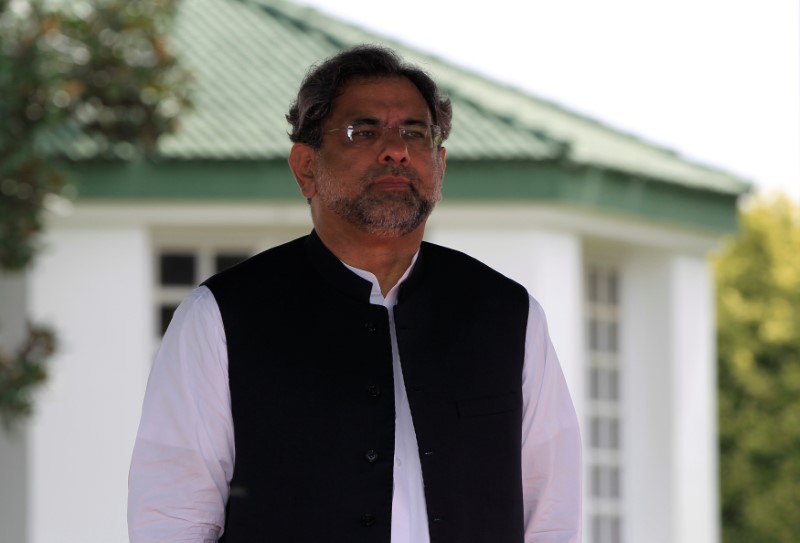By Drazen Jorgic
ISLAMABAD (Reuters) - Pakistan's new Prime Minister Shahid Khaqan Abbasi on Friday formed a cabinet filled with allies of toppled leader Nawaz Sharif, in a reshuffle that appears aimed at bolstering support ahead of general elections due in mid-2018.
Ishaq Dar, a powerful finance minister, returns in the same role, despite a criminal investigation ordered against him by the Supreme Court.
Another staunch Sharif ally, Khawaja Asif, is to be Foreign Minister after having simultaneously run the ministries of defence and power.
The cabinet has almost doubled in size to 47 members, sworn in during a televised ceremony after a reading from the Koran holy book in the mainly Muslim nation of 190 million people.
"It's a massive cabinet," said Pakistani writer and analyst Zahid Hussain. "It shows that it's all about the next election."
But no decision appears to have yet been made by the ruling Pakistan Muslim League-Nawaz (PML-N) party over whether Abbasi will stay as premier or step down after a brief period to make way for Sharif's brother Shahbaz, as outlined previously.
Nawaz Sharif resigned last week after the Supreme Court disqualified him for not declaring a source of income he denies receiving. But he retains control of PML-N and put forward Abbasi as temporary prime minister until Shahbaz becomes eligible to take over by winning a parliamentary by-election.
Since Abbasi's election, however, the party leadership no longer seems sure about that plan, as some fear Shahbaz's departure from his position as chief minister of eastern Punjab state could weaken the party's grip on a core base of voters.
Pakistan's mix of political parties means that whoever wins Punjab, which is home to more than half the country's population, is likely to form the next government.
Former petroleum minister Abbasi, the co-founder of a budget airline, has vowed to run an efficient government but has indicated major decisions will flow from Nawaz, cementing the view of the toppled leader as the power behind the throne.
Abbasi is a staunch Nawaz ally, having been by his side for most of his political career. The cabinet was formed after several discussions between them, and Nawaz's allies.
There are 28 federal ministers and 19 state ministers in the new cabinet, almost double Sharif's 25-strong cabinet when he swept the 2013 polls.
Abbasi will also head a new energy ministry that merges the petroleum and power portfolios.
Ahsan Iqbal, head of a commission tasked with building the Beijing-funded $57 billion China-Pakistan Economic corridor, has been appointed Interior Minister.
The opposition has criticised the PML-N's focus on large infrastructure projects as vote-focused measures that saddle Pakistan with debt, at the expense of schools and hospitals.
"If they carry on with Nawaz Sharif's policies, the country will go deeper into debt," said Naeem Ul Haq, of the opposition Pakistan Tehreek-i-Insaf (PTI) party.
FEUDAL POLITICS
To shore up the voter base in Punjab, Abbasi has added five politicians from prominent families that command huge vote banks in the south of the region, seen as pivotal to the next poll.
A feudal structure in much of rural Pakistan allows powerful families to wield huge influence and command voter allegiances, often easily switched in a nation where political parties are driven more by powerful figureheads than ideology.
The inclusion of five politicians from south Punjab aimed to nail down their loyalties ahead of the 2018 contest, analyst Hussain said.
"There was always been a fear or a concern they would jump ship if the government seems weak," he added.

Under Sharif, the PML-N has also courted the minority vote, using symbolic gestures at odds with its conservative base.